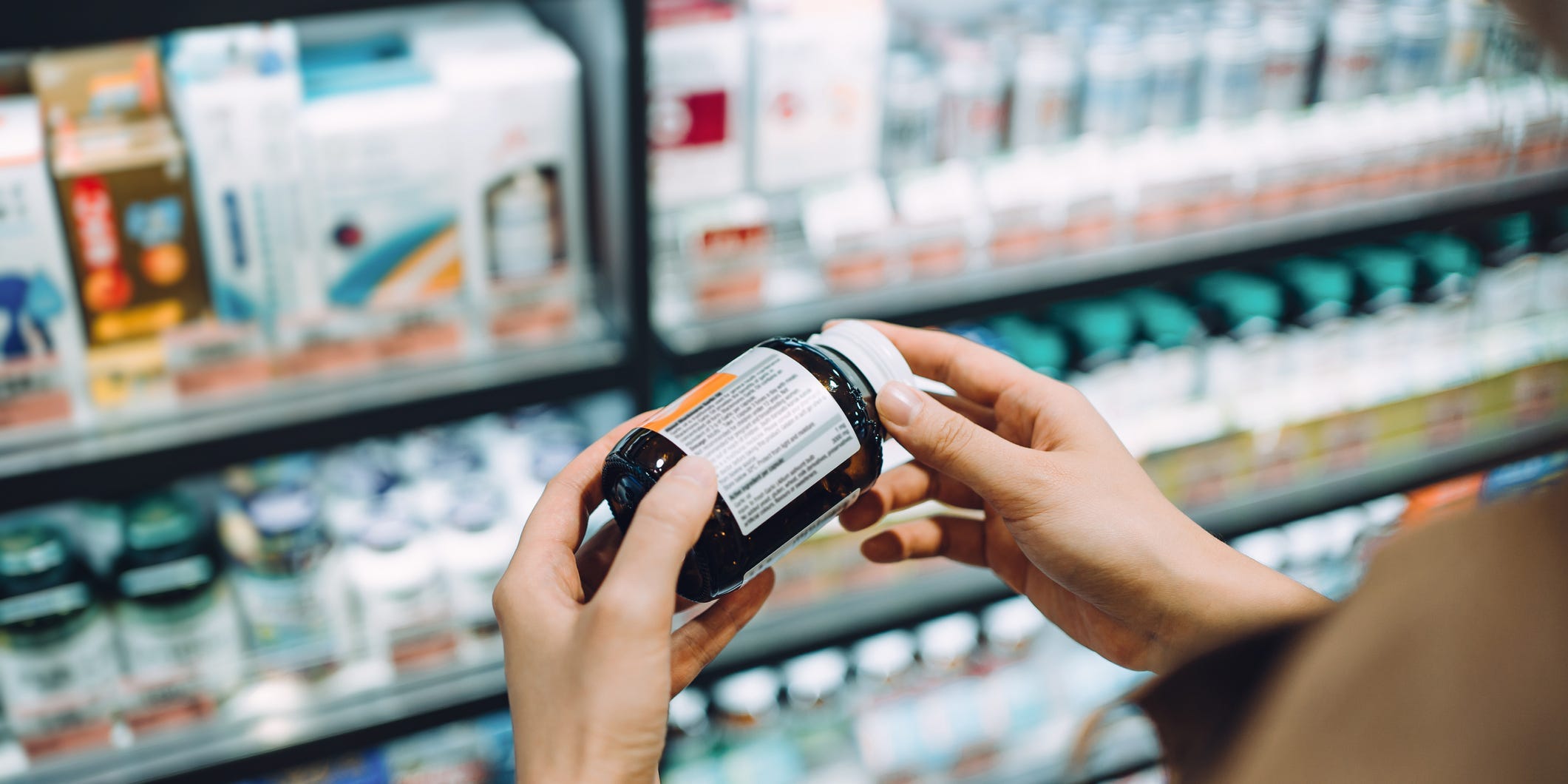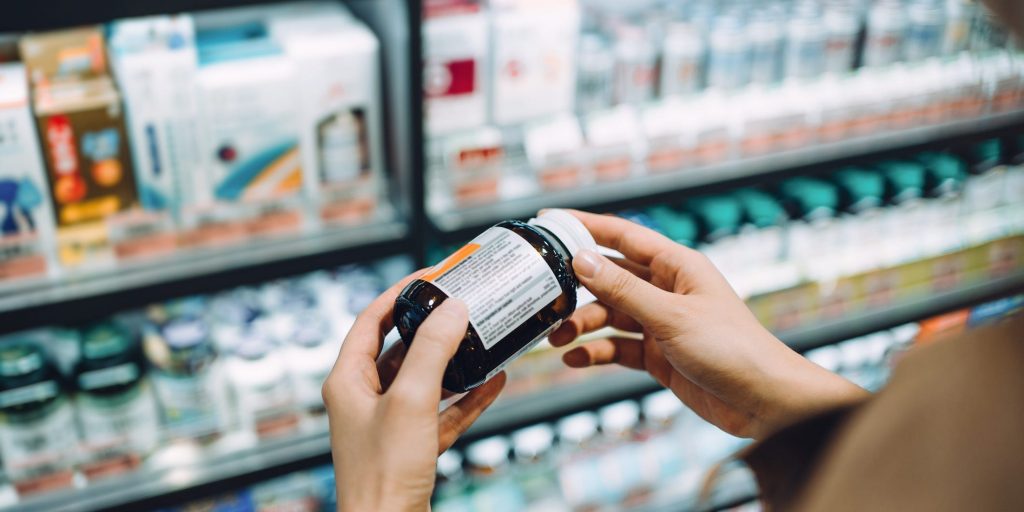
d3sign/Getty Images
- The keto diet can make it hard to get electrolytes like potassium, magnesium, and sodium.
- As a result, you may need to take supplements while on keto to ensure adequate nutrition.
- Try to get as many nutrients as you can through food first, and then take supplements if necessary.
- Visit Insider's Health Reference library for more advice.
Getting adequate amounts of certain vitamins and minerals can be hard when you're following a carbohydrate-restricted ketogenic diet. Supplements – especially magnesium, potassium, and fiber – might be a necessary addition to your routine.
Food first, supplements second
"It takes a concerted effort to ensure you're getting adequate amounts of vitamins, minerals, and phytonutrients while limiting total carbohydrates to under 10% of total daily calories, which is necessary to remain in ketosis," says Ariana Fiorita, RD, a registered dietitian at the Center for Functional Medicine at Cleveland Clinic.
She emphasizes the importance of getting as much of your nutrients as possible through your food, first. But there are certain vitamins and minerals that the body doesn't absorb easily, which is why you should also consider taking supplements to make sure you're getting enough nutrition.
During ketosis, the kidneys flush out more electrolytes than usual, including magnesium, potassium, and salt. If you're experiencing symptoms of keto flu, that may be an indication that your electrolytes are out of balance and you need to replace them.
Try potassium
The recommended daily intake of potassium is 3,400 milligrams (mg) for adult men and 2,600 mg for adult women.
Some of the top sources of potassium - apricots, lentils, and prunes - are also high in carbs, making them off limits for the keto diet. However, keto-friendly foods including chicken, beef, and salmon, all contain around 325 grams of potassium. And two cups of raw spinach packs around 334 mg, so you can still get some potassium from your food while cutting carbs.
Work with your doctor to determine if you need extra potassium while in a state of ketosis. Be aware that most potassium-only supplements contain around 99 mg of potassium - around 3% of the daily value. That's because supplements that contain potassium chloride and more than 99 mg of potassium have been linked to small-bowel lesions.
Also, don't be fooled by supplements that contain potassium iodide, which, despite the misleading name, provide iodine rather than potassium.
Take magnesium
Adults should get between 310 and 420 mg of magnesium daily. But almost half of US adults don't get enough magnesium as it is.
Eliminating magnesium-rich foods like beans as part of a low-carb diet can make it even harder to get your daily dose. Fortunately, there are some keto staples rich in magnesium including almonds, cashews, and peanuts, which all contain between 60 and 80 mg of magnesium per serving.
Magnesium supplements can offer as much as 100% of your daily magnesium needs, but, like the magnesium in foods, your body may not absorb it all.
According to the National Institutes of Health, small studies indicate that magnesium in the aspartate, citrate, lactate, and chloride forms is absorbed more readily than magnesium oxide or magnesium sulfate, however certain forms, including magnesium citrate, may cause bloating or a laxative effect. If this is a concern, magnesium glycinate has been shown to be gentler to your GI system. You can see what form is in your supplement by checking the label.
Magnesium deficiency is difficult to screen for and has been associated with migraine headaches, Alzheimer's disease, insomnia, stroke, hypertension, and cardiovascular disease. Early signs of a deficiency include muscle spasms and stiffness, fatigue, and nausea.
Use extra sodium
Many Americans get too much sodium in their diet, but if you're on the ketogenic diet, chances are you're cutting out many processed foods and may not be dining out as much - two of the leading sources of sodium in the average American diet.
Moreover, some amount of sodium is vital to your health because it helps your muscles and nerves function properly. The Harvard School of Public Health says that the average, healthy adult needs about 500 mg of sodium a day. And you should consume no more than 2,300 mg. Though, this amount can vary depending on your activity levels. People who are more active generally need more sodium in their diet since they lose a lot through sweat.
That said, you don't necessarily need to take a supplement for sodium while on the keto diet. Table salt, aka sodium chloride, is 40% sodium. One teaspoon contains 2,325 mg of sodium. So, if you add a small sprinkle of salt to your meals, that should be plenty.
However, make sure that you're getting enough potassium in addition to sodium, as multiple studies have shown that a diet high in sodium and low in potassium can increase the risk of stroke and heart disease. It's safest to work with a doctor to make sure all your body's nutrients remain at healthy levels
Get more fiber
Women should aim to consume at least 25 grams of fiber per day, while men should consume 38 grams per day. But since fiber is actually a carbohydrate it can be difficult to eat enough of it while following a keto diet.
Though excellent sources of fiber, beans, and other legumes, and whole-grains are high carb foods that don't fit within the ketogenic diet guidelines. For example, one serving of whole wheat bread packs around 14 grams of carbs, a significant proportion of the keto diet's restricted daily carb intake of 20 to 50 grams.
Dietary fiber, which includes both soluble and insoluble fiber, moves food through the digestive tract, which keeps you regular, and it may also help reduce the risk of heart disease, diabetes, and certain types of cancer. Also, according to the Mayo Clinic, soluble fiber - the kind that dissolves in water and is in nuts, seeds, beans, lentils, and certain fruits and veggies - can also lower glucose and blood cholesterol levels.
You can still get enough fiber on the keto diet if you limit your carbs to non-starchy leafy green vegetables like broccoli, cauliflower, Brussels sprouts, and asparagus, says Fiorita. For a boost, look for keto-friendly fiber supplements that don't contain extra sugar. Fiber supplements that need to be mixed with water are also a good way to make sure you're staying hydrated, she says.
Insider's takeaway
Being in a state of ketosis can deplete your body of important nutrients including potassium, sodium, fiber, and magnesium. You should try to get these nutrients from food first - but you can also take supplements to increase your levels.
